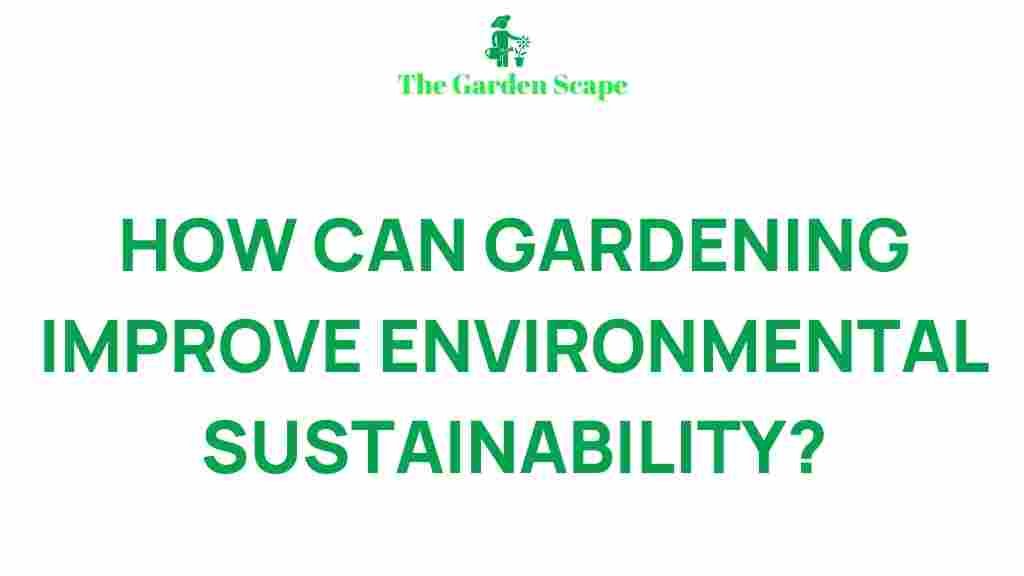How Gardening Enhances Environmental Sustainability
In recent years, gardening has become more than just a hobby or aesthetic pursuit. As environmental concerns continue to rise, people are increasingly recognizing how gardening can contribute to environmental sustainability. From reducing carbon footprints to promoting biodiversity, gardening is a powerful tool for improving the health of the planet. In this article, we will uncover the many ways in which gardening enhances environmental sustainability and offer practical tips for making your garden a sustainable haven.
The Role of Gardening in Promoting Environmental Sustainability
Gardening is a fundamental practice for environmental sustainability, influencing numerous ecological factors. Here are some of the most significant ways in which gardening contributes to a greener, healthier planet:
- Carbon Footprint Reduction: Plants absorb carbon dioxide from the atmosphere during photosynthesis. By growing a variety of plants, you can help lower the levels of carbon dioxide in the air, mitigating the impacts of climate change.
- Enhancing Biodiversity: Gardening supports biodiversity by providing habitat for various species. Whether it’s a garden full of flowers, vegetables, or native plants, your garden can be a sanctuary for bees, birds, and other beneficial creatures.
- Improving Soil Health: Proper gardening practices, such as composting and mulching, improve the health of the soil. Healthy soil is vital for growing crops, retaining water, and preventing erosion.
- Water Conservation: With sustainable gardening techniques such as rainwater harvesting and drip irrigation, you can reduce the need for excessive water use, which is crucial in regions facing water shortages.
- Reducing Waste: Gardening is an excellent way to repurpose organic waste. By composting food scraps and garden trimmings, you can create nutrient-rich soil while diverting waste from landfills.
How to Start a Sustainable Garden
Starting a sustainable garden might seem daunting, but with the right approach, it can be a rewarding and manageable endeavor. Follow these simple steps to begin your journey toward environmental sustainability through gardening.
Step 1: Choose the Right Location
Choosing the ideal location for your garden is the first crucial step. Look for an area that receives sufficient sunlight and is easily accessible for watering. Ideally, it should also have well-drained soil and minimal exposure to harsh winds.
Step 2: Select Native Plants
Native plants are naturally adapted to the local climate and require less water and maintenance. By choosing native species, you can contribute to preserving local ecosystems and provide habitat for native wildlife.
Step 3: Plan for Water Conservation
Watering is one of the most critical aspects of gardening, especially in areas with limited rainfall. To conserve water, opt for drip irrigation systems or soaker hoses, which deliver water directly to the roots where it’s needed most. Additionally, consider installing rain barrels to collect rainwater, reducing the need for tap water.
Step 4: Implement Sustainable Soil Practices
Soil health is a fundamental part of sustainable gardening. Avoid using chemical fertilizers and pesticides, which can harm beneficial organisms in the soil. Instead, enrich the soil with compost, organic matter, and mulch. These materials help improve soil structure, retain moisture, and provide essential nutrients to plants.
Step 5: Minimize Waste with Composting
Composting is one of the best ways to recycle organic waste and reduce your carbon footprint. By composting kitchen scraps, garden trimmings, and yard waste, you can create nutrient-dense soil that enhances plant growth while minimizing landfill waste. Start a compost bin or pile in your garden to get started.
Gardening and Its Impact on the Local Ecosystem
The benefits of gardening extend beyond your backyard. By creating a thriving garden, you help foster a healthy local ecosystem. Gardens provide essential resources for pollinators, including bees, butterflies, and hummingbirds, which are vital for the production of food and the health of other plants. Additionally, gardens help mitigate urban heat island effects by cooling the environment and reducing air pollution.
Troubleshooting Common Gardening Challenges
While gardening can be a fulfilling and sustainable practice, it does come with its own set of challenges. Here are a few common issues and solutions to ensure your garden thrives:
- Problem: Poor Soil Quality
Solution: Amend the soil with organic compost and mulch to improve its texture and nutrient content. Test the soil regularly to check pH levels and nutrient deficiencies. - Problem: Pest Infestations
Solution: Instead of resorting to harmful pesticides, try using organic pest control methods like neem oil, diatomaceous earth, or introducing beneficial insects such as ladybugs. - Problem: Water Scarcity
Solution: Use drought-tolerant plants, implement rainwater harvesting, and apply mulch to retain moisture in the soil. Consider xeriscaping to reduce water usage. - Problem: Invasive Plant Species
Solution: Research and carefully choose plants that are native to your region to avoid the spread of invasive species that may outcompete native flora.
Additional Resources for Sustainable Gardening
For more information on sustainable gardening practices, you can explore these helpful resources:
- EPA’s Green Infrastructure Overview – Learn how green infrastructure can support sustainability efforts in gardening and urban environments.
- Gardening for Biodiversity – Find out how to attract and protect wildlife in your garden with simple gardening techniques.
Conclusion
Gardening is much more than an enjoyable hobby—it’s an essential practice for enhancing environmental sustainability. Whether you’re reducing your carbon footprint, conserving water, or providing a haven for local wildlife, the positive impact of gardening on the environment cannot be overstated. By following the steps outlined in this article, you can create a sustainable garden that contributes to the health of the planet while enjoying the numerous benefits of growing your own food and plants. Start today and be part of the global movement towards a greener, more sustainable world.
Remember, every small step counts, and with gardening, you’re making a big difference!
This article is in the category Guides & Tutorials and created by TheGardenScape Team

1 thought on “Unveiling the Secrets of How Gardening Enhances Environmental Sustainability”